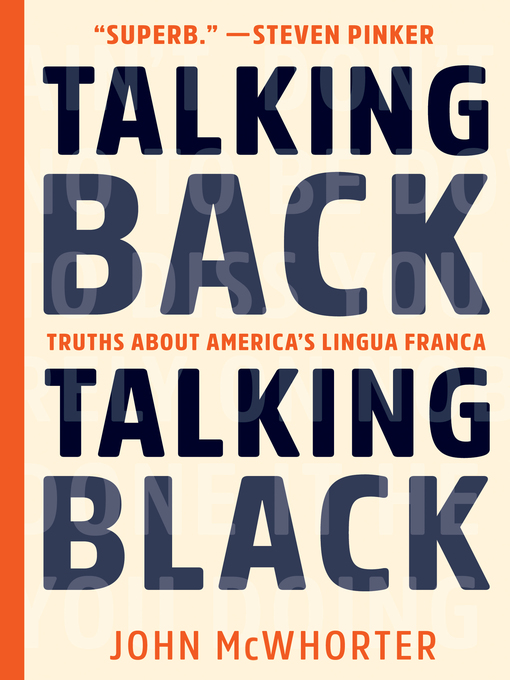John McWhorter teaches linguistics, Western civilization, music history, and American studies at Columbia University. A New York Times best-selling author and TED speaker, he is a columnist for CNN.com, a regular contributor to the Atlantic, a frequent guest on CNN and MSNBC, and the host of Slate's language podcast, Lexicon Valley. His books on language include The Power of Babel; Our Magnificent Bastard Tongue; Words on the Move; Talking Back, Talking Black; and The Creole Debate.
-
Creators
-
Publisher
-
Release date
December 19, 2016 -
Formats
-
Kindle Book
-
OverDrive Read
- ISBN: 9781942658214
- File size: 1026 KB
-
EPUB ebook
- ISBN: 9781942658214
- File size: 1025 KB
-
-
Languages
- English
-
Reviews
-
Kirkus
November 1, 2016
A compact, lively defense of the grammatical legitimacy of "Black English."McWhorter (Linguistics, Music History, American Studies/Columbia Univ.; Words on the Move: Why English Won't--and Can't--Sit Still, 2016, etc.) has been involved in the controversies surrounding African-American Vernacular English for 20 years, when the news of Oakland, California's schools' consideration of an Ebonics curriculum provided him "fifteen minutes of modest media notoriety [as a] black linguist." Although the debate on Ebonics faded, McWhorter concluded, "racism is hardly the only thing standing between how linguists see Black English and how the public sees it." Thus, his approach focuses equally on discerning intricate grammatical principles within AAVE and on the larger mysteries of how shared culture affects seemingly individualized traits like speech patterns. He gradually expands his perspective over the book's five essays, first defusing the question of whether African-Americans can be said to "sound black." He notes that the issue's sensitivity may be "because Black English is so often associated with stupidity that one can't help wanting to disidentify from it." Meanwhile, even well-meaning white people are reluctant to explore their own assumptions for fear of appearing racist. Similarly, many black and white Americans cannot accept the legitimacy of Black English due to its apparent inappropriateness for certain social or professional situations, despite the fact that "no Black English advocate is calling for Black English to be allowed in [job] interviews." McWhorter notes that black Americans today are necessarily experts in code-switching, or utilizing both Standard and Black English in different contexts. "The two things do not cancel each other out: They coexist," he argues. Still, the enduring taint of minstrel culture continues to quash intellectual inquiry into black linguistics, as many are convinced "that a black way to talk has something to do with white racist caricature." The author confidently untangles these issues, writing in an accessible and wry yet precise style. A vibrant separation of an African-American vernacular tradition from the thickets of contemporary racial debate.COPYRIGHT(2016) Kirkus Reviews, ALL RIGHTS RESERVED.
-
Booklist
December 1, 2016
In the late 1990s, racial politics drove controversial debates about Ebonics, or black English, in schools. Linguist McWhorter (Winning the Race, 1986) now offers a broader historical context in which to consider how people of different cultures around the world and across time have spoken in different dialects. The perception persists that black English is standard English spoken badly. McWhorter argues that it is far more than that. Drawing on research, popular culture, and his own expertise as a linguist and black American, McWhorter conveys the roots and richness of the dialect that has come out of the experiences of black Americans. He examines particular differences in verb conjugations that demonstrate a more complex notion of when actions occur, defying the myth that black English is simplistic. McWhorter debunks other notions, such as the assumption that the black accent is simply a southern accent. This is an engaging look at the English language as spoken by many black Americans as well as the long history of stereotyping that has prevented an objective analysis of a rich language tradition.(Reprinted with permission of Booklist, copyright 2016, American Library Association.)
-
Formats
- Kindle Book
- OverDrive Read
- EPUB ebook
subjects
Languages
- English
Loading
Why is availability limited?
×Availability can change throughout the month based on the library's budget. You can still place a hold on the title, and your hold will be automatically filled as soon as the title is available again.
The Kindle Book format for this title is not supported on:
×Read-along ebook
×The OverDrive Read format of this ebook has professional narration that plays while you read in your browser. Learn more here.


